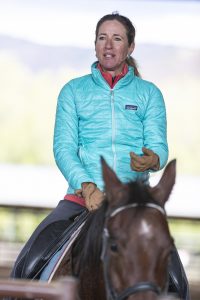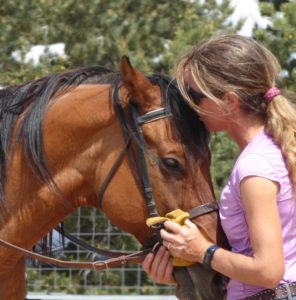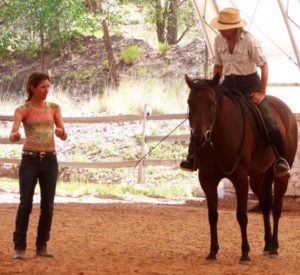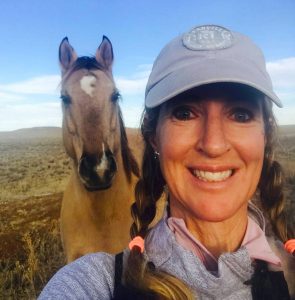
Katrin Silva
Editor’s Note:
Katrin Silva grew up riding dressage in Germany before moving to the United States at age 19 to learn to ride Western. She’s been riding both disciplines for the last twenty years.
Silva has competed successfully through fourth level dressage on quarter horses, Morgans, Arabians, Hanoverians, and many other breeds. Based in New Mexico, she enjoys improving horse-rider partnerships and believes that good riding is always good riding, no matter which type of tack a horse is wearing. Check out her blog here.
Buy her book, Dressage for All of Us, here.
Katrin wrote this essay as the pandemic was just beginning in the U.S. One month later, it is even more relevant.
She writes:
 Yesterday was the kind of warm, sunny day we don’t often get in March in New Mexico. I rode without a jacket for the first time since November. When I brushed down my last horse of the day and walked him back to his paddock, I noticed signs of spring everywhere: dandelions, budding trees, birds singing. I put away my saddle, swept the aisle, and said good-bye to the horses. Then, I got into my car and turned on the local NPR station. Reality came flooding back all at once: pandemic updates, statistics (rising exponentially!) new recommendations for travel (avoid!) and social distancing (practice with vigilance!). My peace of mind dissolved into intense anxiety.
Yesterday was the kind of warm, sunny day we don’t often get in March in New Mexico. I rode without a jacket for the first time since November. When I brushed down my last horse of the day and walked him back to his paddock, I noticed signs of spring everywhere: dandelions, budding trees, birds singing. I put away my saddle, swept the aisle, and said good-bye to the horses. Then, I got into my car and turned on the local NPR station. Reality came flooding back all at once: pandemic updates, statistics (rising exponentially!) new recommendations for travel (avoid!) and social distancing (practice with vigilance!). My peace of mind dissolved into intense anxiety.
In a normal year, I savor this season. Spring means longer days and warmer weather. In a normal year, I look forward to horse shows and clinics, getaway weekends, and road trips. In a normal year, I enjoy the promise of warm evenings, backyard dinners with friends, barn get-togethers. In a normal year, this is a time for optimism.
This is not a normal year. This is a year of social distancing and frightening visions of the future.
So far, I’ve been lucky. I still get to spend my days at the barn. My training business operates out of a small and mostly open-air stable, so I can still go to work without feeling socially irresponsible. Other than me, one barn worker, and, on some days, one working student, are the only ones there all day. My clients may show up one at a time, to take lessons, ride their horses, or to just hang out with their equine friends for an hour or so.

Silva teaches in and around Santa Fe, NM. A pre-pandemic moment
The riders I teach range in age from ages 14 to 71. They’re a pretty diverse bunch, but they have all made the same kind of comment: that horse time is the highlight of their days, especially now, that they need to be close to their horses, to see them, touch them, smell them, that their horses are a lifeline.
I agree completely. Without horses, I would go insane with fear and worry. Horses are a source of warmth, of grounding, of simple comfort. We can’t hug each other, but we can still hug our horses. More than that, when we ride, we connect with our horses – our backs to their backs, our hands to their mouths, our legs to their sides, our minds to theirs.
They force us back into the here and now, which acts as a much needed antidote to the skyrocketing anxiety levels so many of us are experiencing. When I am with a horse, I don’t think about the latest statistics. I don’t obsess about the grim situation. I am still peripherally aware of it, but I don’t feel the deep, gnawing dread that washes over me without warning at other times – while looking at empty parking lots, washing my hands for the seventh time today, or watching the news.

Katrin and friend
We are living in strange times – threatened by a deadly virus, a collapsing economy, and the uncertainty of what lies ahead. I worry about my elderly parents in Germany, about friends and family members with compromised immune systems. I worry about my business. Horses are not just my passion, they’re my livelihood.
Most of my clients love their horses as much as I do, but at the same time, these horses are a costly luxury whose upkeep and education they can’t afford in hard times, like those we live in now. The current crisis may mean the end of my horse training career, even the end of the horse industry as we know it, or it may just be a temporary setback. No one can tell yet, though graphs and maps leave little room for optimism.
Because of what horses have taught me, I am not panicking. Instead, I am living and working, one day at a time. I still have horses in training. Even as New Mexico goes on total lockdown, I am still be able to go to the barn because taking care of animals is considered essential.
I worry about what my students, and I, would do without horses. We need horses in our lives, now more than ever.